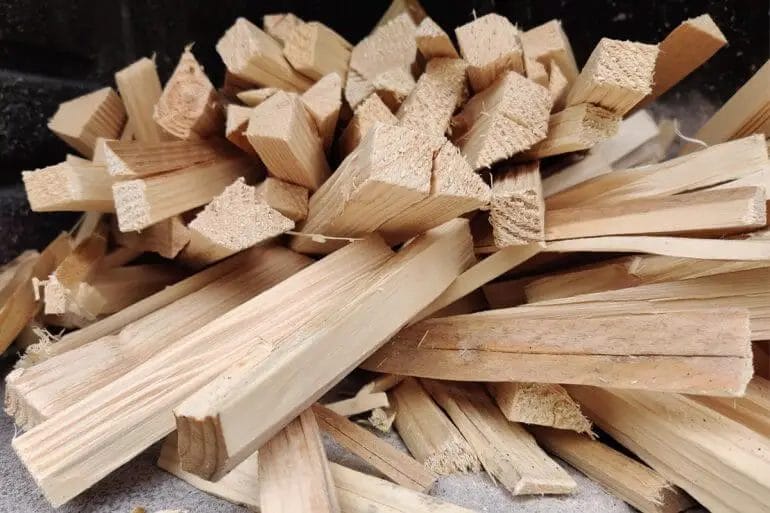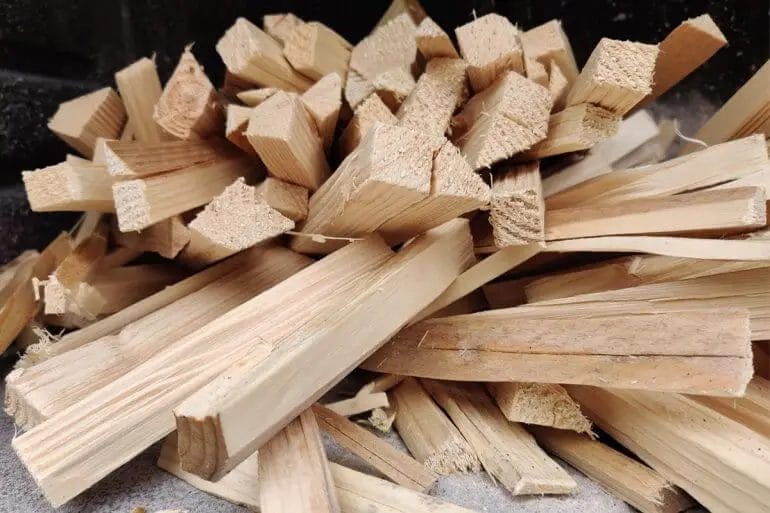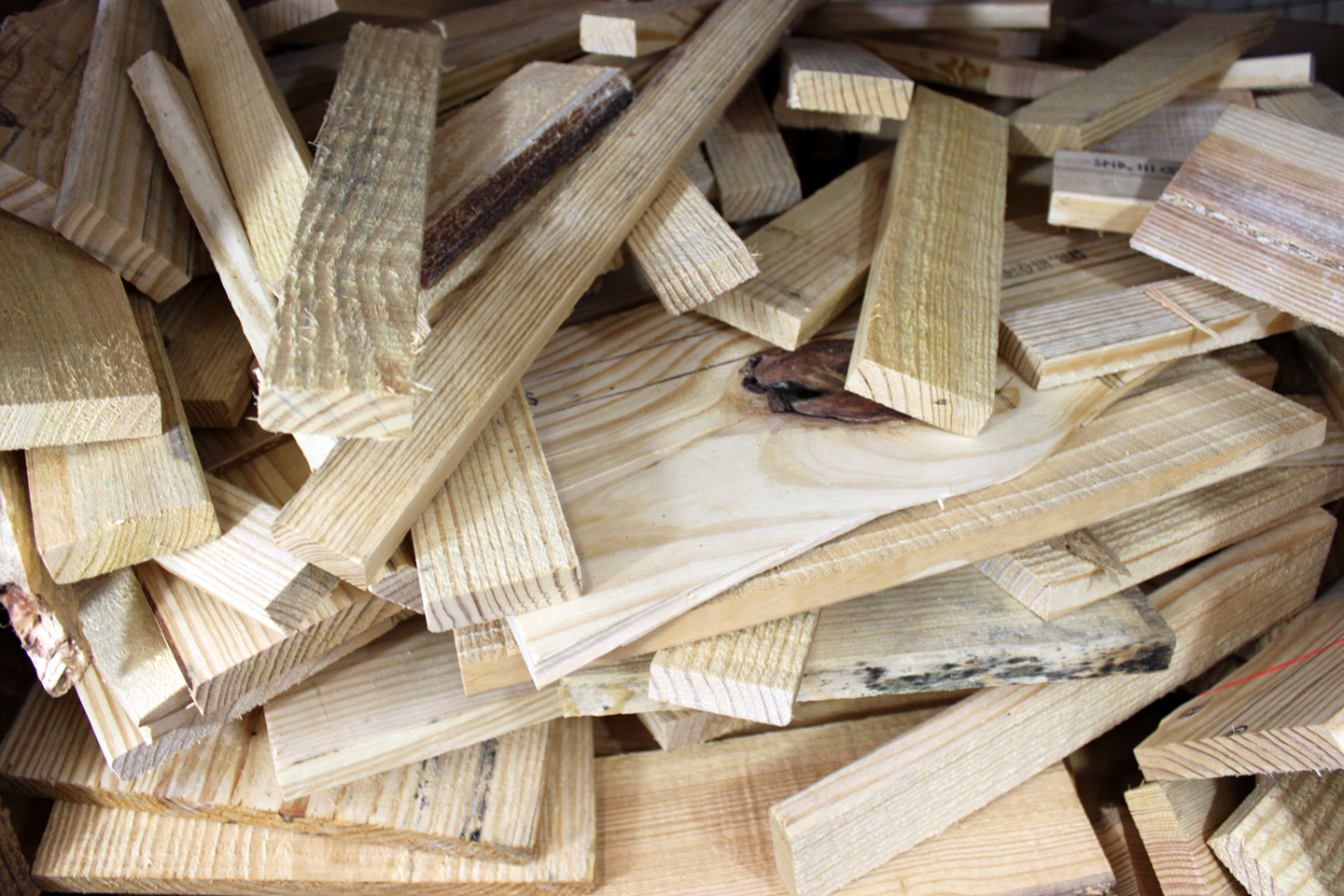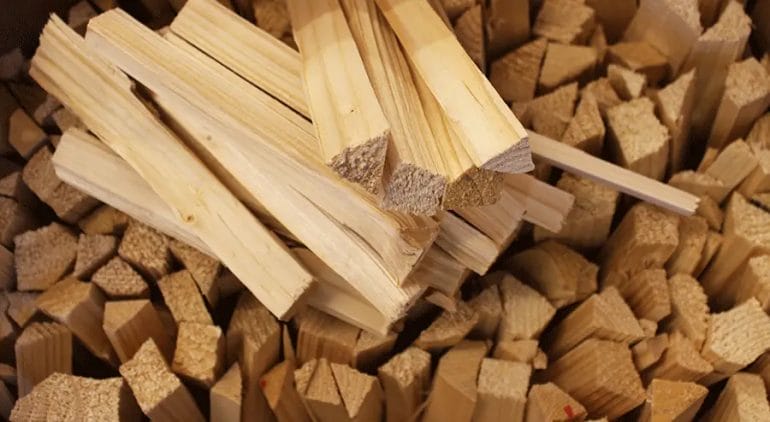Kindling wood is essential for starting a fire quickly and easily. It refers to small, dry pieces of wood that ignite easily and produce a strong flame. Whether you’re camping, using a fireplace, or a wood-burning stove, kindling wood helps to ignite larger logs and create a steady source of heat. It is typically made from softwoods like pine or cedar, which are lightweight and have a high resin content, making them ideal for catching fire and producing heat rapidly.

Different Types of Kindling Wood and Their Effectiveness
Kindling wood is an essential component when it comes to starting a fire. It helps ignite the larger pieces of firewood and provides a steady flame to build upon. However, not all kindling wood is created equal. Different types of wood have varying characteristics that can affect their effectiveness as kindling. In this section, we will explore the different types of kindling wood and their effectiveness in starting a fire.

Dry Pine Needles and Twigs
Dry pine needles and twigs are commonly used as kindling due to their abundance and easy accessibility. They are highly flammable and ignite quickly, making them effective in starting a fire. However, pine needles burn relatively fast, so it is important to have a sufficient amount to sustain the fire until the larger logs catch fire.
Cedar and Redwood Shavings
Cedar and redwood shavings are often used as kindling because they contain natural oils that make them highly flammable. They produce a strong and aromatic flame, making them ideal for starting fires in outdoor settings such as camping trips or backyard bonfires. However, it is important to note that cedar and redwood shavings may be more difficult to find compared to other types of kindling wood.
Dried Hardwood Twigs
Dried hardwood twigs, such as oak or maple, are excellent choices for kindling wood. They burn slowly and provide a steady flame, giving enough time to ignite the larger logs. Hardwood twigs are readily available in many regions and can be easily collected from fallen branches or pruned trees. They are a reliable and effective option for starting a fire.
Fatwood
Fatwood, also known as pine fatwood or lighter wood, is highly resinous and extremely flammable. It is derived from the heartwood of pine trees and contains a high concentration of resin, which serves as a natural fire starter. Fatwood ignites quickly and burns for an extended period, making it a reliable choice for kindling. It can be purchased or obtained from the stumps or knots of pine trees.
Paper and Cardboard
Paper and cardboard can also be used as makeshift kindling when other options are not readily available. They ignite easily and provide a fast-burning flame, but they may not sustain the fire for a long duration. It is important to exercise caution when using paper and cardboard as kindling, as they can produce more smoke compared to natural wood options.
Summary
In summary, there are various types of kindling wood available, each with its own effectiveness in starting a fire. Dry pine needles and twigs, cedar and redwood shavings, dried hardwood twigs, fatwood, and paper/cardboard are all viable options depending on availability and specific fire-starting needs. It is important to choose the right kindling wood based on its flammability, burn time, and the type of fire you intend to build. Remember to always exercise caution and follow proper fire safety precautions when starting a fire.

Steps to Properly Prepare and Store Kindling Wood
Kindling wood is an essential component for starting a fire. Whether you’re using it for your fireplace, wood stove, or campfire, properly preparing and storing kindling wood can make all the difference in getting a fire going quickly and efficiently. In this section, we will outline the steps to properly prepare and store kindling wood.
Gather the Right Materials
The first step in preparing and storing kindling wood is to gather the necessary materials. You will need the following:
- A stack of dry firewood
- A chopping block or sturdy surface
- A sharp axe or hatchet
- Safety goggles and gloves
- A storage container or firewood rack
Select the Right Type of Wood
When choosing wood for kindling, it’s important to select the right type. Softwoods such as pine, cedar, or spruce are ideal for kindling as they ignite quickly and produce a hot flame. Avoid using hardwoods like oak or maple, as they can be harder to light.
Cut the Wood into Small Pieces
Using a sharp axe or hatchet, carefully chop the dry firewood into small pieces. Aim for pieces that are approximately 1/2 to 1 inch in diameter and 6 to 8 inches in length. This size is ideal for kindling as it allows for easy ignition and quick burning.
Create a Kindling Bundle
Once you have cut the wood into small pieces, gather them together and create a kindling bundle. Hold the pieces together tightly and secure them with twine or rope. This will help keep the kindling organized and make it easier to transport and store.
Store Kindling in a Dry Location
Proper storage is crucial to ensure that your kindling wood remains dry and ready for use. Choose a storage container or firewood rack that provides protection from moisture and allows for proper airflow. Keep the kindling off the ground to prevent it from absorbing moisture. It’s also a good idea to cover the kindling with a tarp or waterproof cover to further protect it from the elements.
Keep Kindling Easily Accessible
To make the process of starting a fire more convenient, keep your kindling wood easily accessible. Store it near your fireplace, wood stove, or fire pit so that it’s readily available when needed. This will save you time and effort when it comes to starting a fire.
Regularly Replace and Maintain Kindling
Kindling wood can deteriorate over time, especially if it becomes wet or exposed to the elements. It’s important to regularly replace and maintain your kindling supply to ensure it’s always in good condition. Inspect the kindling regularly for signs of moisture or decay and replace any pieces that are no longer usable.
Summary
Properly preparing and storing kindling wood is essential for successfully starting a fire. By following these steps, you can ensure that your kindling is dry, easily accessible, and ready to ignite. Remember to gather the right materials, select the right type of wood, cut it into small pieces, create a kindling bundle, store it in a dry location, keep it easily accessible, and regularly replace and maintain your supply. With these measures in place, you’ll be able to start fires efficiently and enjoy the warmth and comfort they provide.

Creative Uses for Kindling Wood Beyond Starting Fires
Kindling wood is typically used to start fires and help them burn more efficiently. It is usually small, dry pieces of wood that catch fire easily. However, there are many creative uses for kindling wood beyond just starting fires. In this section, we will explore some of these unique uses and how they can add value to your daily life.
1. DIY Crafts
One of the most popular creative uses for kindling wood is in DIY crafts. You can create beautiful and rustic home decor items like picture frames, coasters, and candle holders using small pieces of kindling. The natural texture and grain of the wood can add a unique touch to your creations, giving them a warm and inviting feel.
2. Garden Pathways
Another creative way to use kindling wood is to create garden pathways. By arranging the pieces of kindling in a pattern or mosaic, you can create a charming and rustic pathway in your garden. This not only adds visual interest to your outdoor space but also provides a functional walkway for you and your guests.
3. Plant Markers
If you enjoy gardening, using kindling wood as plant markers can be a fun and practical idea. Simply write the names of your plants on small pieces of kindling and place them in your garden beds or pots. This not only helps you keep track of your plants but also adds a rustic touch to your garden.
4. Natural Air Freshener
Instead of using artificial air fresheners, you can create your own natural air freshener using kindling wood. Simply soak small pieces of kindling in essential oils of your choice and place them in a bowl or jar. The wood will absorb the scent of the oils and release a subtle fragrance, making your home smell fresh and inviting.
5. Kinetic Art
Kindling wood can also be used to create unique kinetic art pieces. By attaching small pieces of kindling to strings or wires, you can create mobiles or sculptures that move with the wind or when touched. These artistic pieces can be a beautiful addition to your home or outdoor space, adding a touch of movement and creativity.
6. Natural Bird Perches
If you have bird feeders in your garden, you can use kindling wood as natural perches for the birds. Simply attach small pieces of kindling to the sides of the feeders or nearby branches, creating a comfortable spot for birds to rest and eat. This not only adds a rustic touch to your bird feeders but also provides a natural and safe perch for the birds.
7. Wood Slice Coasters
Another creative use for kindling wood is to make wood slice coasters. By cutting thin slices from larger pieces of kindling and sanding them down, you can create unique and natural coasters for your drinks. The natural textures and patterns of the wood slices will add a rustic and organic touch to your table setting.
8. Camping Kindling Bundle
If you enjoy camping, creating a kindling bundle can be a convenient way to bring along your fire-starting material. Bundle small pieces of kindling together using twine or cord, making it easy to transport and store. This ensures that you always have dry and ready-to-use kindling to start your campfire.
9. Natural Charcoal
If you prefer using natural charcoal for grilling, you can make your own from kindling wood. Simply burn small pieces of kindling in a controlled environment until they turn to charcoal. This homemade charcoal can be used for cooking, providing a natural and flavorful option for your barbecues and outdoor cooking sessions.
10. Crafting Miniature Furniture
If you enjoy crafting miniature items, kindling wood can be a great material to work with. You can create small-scale furniture pieces like chairs, tables, and shelves using tiny pieces of kindling. These miniature furniture pieces can be used for dollhouses, dioramas, or as decorative items on their own.
In summary, kindling wood has many creative uses beyond starting fires. From DIY crafts to garden pathways and natural air fresheners, there are numerous ways to repurpose kindling wood and add a rustic touch to your daily life. So, the next time you have some kindling wood on hand, consider exploring these unique and inventive ideas.
Safety Tips for Handling and Igniting Kindling Wood
Kindling wood is an essential component for starting a fire, whether it’s for camping, a cozy fireplace, or a backyard bonfire. While kindling wood is relatively small and easy to handle, it is still important to follow certain safety precautions to prevent accidents and ensure a safe fire-starting experience. In this section, we will discuss some important safety tips for handling and igniting kindling wood.
1. Store Kindling Wood Properly
Before you even start handling kindling wood, it is crucial to store it in a safe and suitable location. Keep your kindling wood in a dry area away from any potential sources of heat or ignition, such as stoves, fireplaces, or direct sunlight. Storing kindling wood safely helps prevent accidental ignition and keeps it ready for use when needed.
2. Use Protective Gear
When handling kindling wood, it is advisable to wear appropriate protective gear. Thick gloves can protect your hands from splinters and potential injuries. Additionally, wearing eye protection, such as safety goggles, can shield your eyes from flying wood chips or sparks while handling or igniting the kindling.
3. Prepare a Safe Fire Area
Before igniting the kindling wood, ensure you have a designated fire area that is safe and appropriate for the size of the fire you intend to build. Clear any flammable materials or debris from the area, and make sure it is located at a safe distance from any structures or overhanging branches. It is also recommended to have a fire extinguisher or a bucket of water nearby in case of emergencies.
4. Arrange Kindling Properly
When placing the kindling wood, make sure to arrange it in a loose and orderly manner. Avoid overcrowding the fire area with too much kindling, as it may hinder airflow and make it challenging for the fire to catch. A well-arranged stack of kindling allows for proper ventilation and promotes efficient ignition.
5. Use Safe Ignition Methods
When it comes to igniting the kindling wood, opt for safe ignition methods. Avoid using flammable liquids, such as gasoline or lighter fluid, as they can cause uncontrolled fires and pose a significant safety risk. Instead, use safer alternatives like matches, lighters, or firestarters specifically designed for kindling wood ignition. Always follow the manufacturer’s instructions when using firestarters.
6. Monitor the Fire
Once the kindling wood ignites, closely monitor the fire. Never leave a fire unattended, especially if there are children or pets present. Ensure the fire remains at a manageable size by adding additional fuel gradually and responsibly. Avoid adding large pieces of wood or debris that may create a sudden burst of flames or uncontrollable fire.
7. Properly Extinguish the Fire
After enjoying the warmth and ambiance of a fire, it is crucial to properly extinguish it. Use water or a fire extinguisher to douse the flames, making sure all embers are fully extinguished. Stir the ashes and ensure there are no remaining hot spots. Once the fire is completely out, dispose of the ashes in a designated fire-safe container or designated area.
In summary, handling and igniting kindling wood can be done safely by following these essential tips. Store your kindling wood properly, use necessary protective gear, prepare a safe fire area, arrange the kindling properly, use safe ignition methods, monitor the fire, and properly extinguish it after use. By practicing these safety measures, you can enjoy the warmth and beauty of a fire while ensuring the well-being of yourself and others.
FAQs
What is kindling wood?
Kindling wood refers to small pieces of dry and easily combustible wood used to start a fire. It is typically thinner and shorter than regular firewood and ignites quickly due to its low moisture content. Kindling is essential for providing the initial flame and heat needed to ignite larger pieces of firewood.
Conclusion:
In conclusion, kindling wood is an essential component when it comes to starting a fire. Its small and dry pieces make it easier to ignite and create a strong flame. Whether you are camping, using a fireplace, or grilling outdoors, having kindling wood on hand is crucial for a successful fire-starting experience. Its lightweight nature and efficient burn rate make it a popular choice for fire enthusiasts. So, next time you’re in need of some extra warmth or want to cook a delicious meal over an open flame, remember the importance of kindling wood as the foundation of your fire.